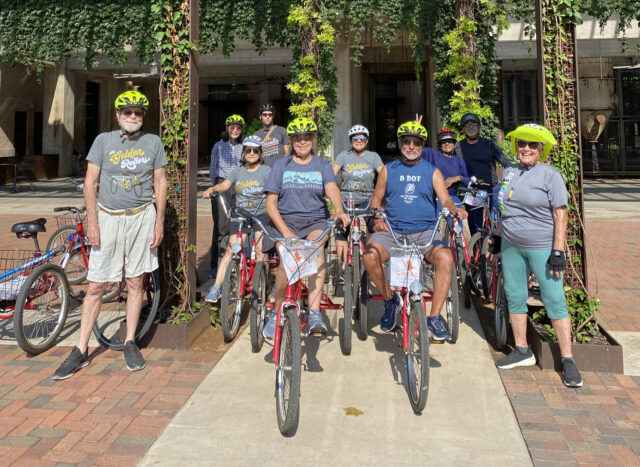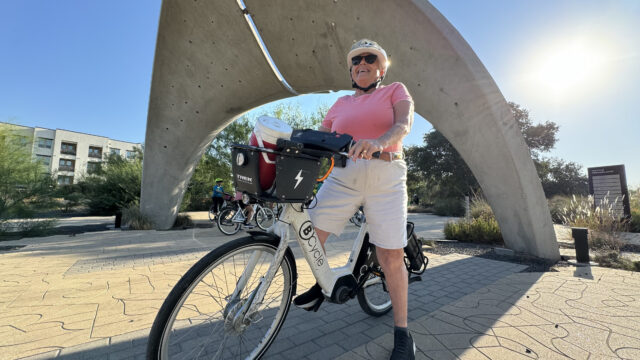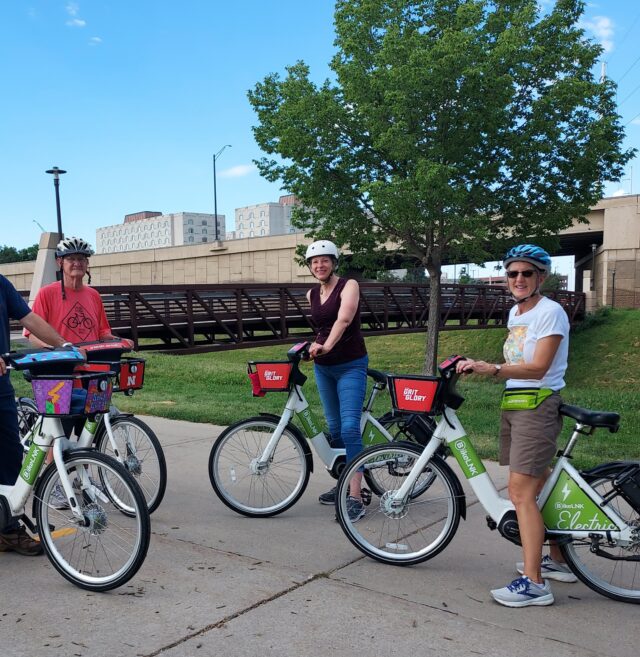Educating Older Adults on Bike Share
by Odochi Akwani, Writer and Content Manager
July 17, 2025
How two cities promote shared micromobility to older adults, increasing representation among riders 50+.

Older riders are underrepresented in bike share, according to the North American Bikeshare and Scootershare Association’s 2023 State of the Industry Report. Adults ages 45 and older remain underrepresented, especially those 65+. In Lincoln, Nebraska, BikeLNK is working to introduce older adults, those 60 and older, to micromobility through a series of bike share 101 classes in collaboration with the city’s Aging Partners department. In San Antonio, Texas, the nonprofit Ghisallo Cycling Initiative has a program to increase bike share access and knowledge to adults 50 and older.
Ghisallo Cycling Initiative is a nonprofit dedicated to increasing access to bicycling in Austin and San Antonio. Through its Golden Rollers program, its efforts focus on older adults. In 2022, the San Antonio division took a step forward by adding bike share to the Golden Rollers program. For that work, it applied for and received a BBSP mini-grant.
Now that it is entering its fourth year, the program has continued collaborating with San Antonio BCycle and incorporating bike share into its programming.
The program runs from August through December with approximately 25–35 riders in a cohort who receive a free one-year pass to use San Antonio BCycle. A lunch and learn session is held first to answer any questions participants may have and to discuss scheduling. Then, Ghisallo hosts a new rider orientation to introduce residents to the bike share system, followed by a short loop in the parking lot to help riders get comfortable with the bikes.
Education on safely mounting and dismounting bikes is critical.
“Early on, we realized e-bikes are heavier, and you do need a bit of control to keep the balance,” says Cristina Solorzano, Ghisallo Cycling Initiative’s San Antonio team lead and community educator. “So, we make sure to introduce the e-bikes first to the community to make sure that they’re comfortable.”
According to Solorzano, some people felt nervous riding because of the weight of the battery on the bikes, so they watched others until they gained confidence. She credits the program’s success partly to the orientation, which laid the foundation for the program.
“Without orientation, we would have a lot of anxious riders, or a lot of people who would feel expectations to keep up with the group, even though they’re not comfortable and confident to get there yet,” she says.
In the program, Ghisallo community educators accommodate skill and comfort level. If a rider needs more support to start riding, they will meet with them one-on-one on a different day.
“We want to make sure that they are confident, comfortable, and sure of themselves. That they can handle this bicycle, they can join the group ride, and they can be part of this cycling community on e-bikes,” says Solorzano. “And, knowing that they can also group up with themselves once the program is over, once they don’t have us anymore.”
One rider has done exactly that. Frances Silva, 70, from northwest San Antonio, started a twice-weekly social biking group for Golden Roller program participants. The group meets downtown at the Commander’s House Adult and Senior Center. They then walk 20 minutes along the San Antonio Missions Trail to a nearby bike share station and ride along the trail together until they want to turn back.

photo of Frances Silva
“I know that the more people you have with you, the more fun you’ll have, because you’re riding and you’re talking and you’re telling jokes,” says Silva. “The wildlife that we see and the people we experience on our path, and then the history here in San Antonio, it’s just fantastic, and we share that amongst each other.”
In Lincoln, the bike share system BikeLNK is focused on bringing a series of learning sessions to promote the system and cycling to Lincoln seniors. The program, in partnership with the city’s Aging Partners department, has been going since 2022 as part of a grant from AARP. The city was recently awarded another nearly $20,000 grant from AARP to continue its programming to educate older adults in using public transportation. Included in the series of bike share classes is an update to multilingual documents with tips on using BikeLNK and the city’s bus system with translations in Kurdish, French, and Nuer.

Photo courtesy of Aging Partners’ Living Well magazine
BikeLNK noted that there’s been a learning curve for this demographic when it comes to understanding bike share, so getting information out about bike share was part of the reason why they wanted to work with Aging Partners on these sessions.
“Usually, the people who join us are interested in the background and the business side of BikeLNK, how we’re sustainable in the community, and who’s funding what — outside of the typical rider’s zone of interest,” says Hunter Arias, BikeLNK city manager. “As people who have lived in Lincoln for a long time, they are really invested in the community.”
The sessions are capped at 10 participants and run monthly from June through September. It begins with a 45-minute talk from Arias about BikeLNK and its history in the city of Lincoln, as well as e-bike education. Then, they go for a 4-mile round-trip group ride. Afterward, they recap the ride together and Arias shares how participants can get a reduced-cost pass for adults age 62 and older, which is half off a yearly pass, making it $50/year.
“Any opportunity they have to go out with people that are their age and increase the level of comfort that they have doing something that is maybe outside of their comfort zone,” says Arias. “They were ready and willing to express their goals, and a lot of their goals were just to get on bikes.”
At their June session, a rider ended up falling from their bike. Ann Heydt, program assistant at Aging Partners, coached them on how to get back up safely by leaning against a rock to get up from ground level. According to Arias, this rider ended up signing up for the rest of the sessions this year.
“Some have not ridden a bike for a long time, many years, and may not have the confidence to get on a bike. So this is the introduction to it,” says Heydt. “Every time we’ve had groups come, they always say this was more fun and easier than I thought it was going to be.”
Peggy Volker, 77, from Southeast Lincoln, was interested in these classes when her husband brought up the idea of buying an e-bike. Peggy and her husband are active in the Lincoln bike community as members of the Great Plains Trails Network. They were interested in how an e-bike could help them tackle some of the hills they encounter when riding a trail from their house to downtown and back, without having to get off their bikes and push them uphill.
“We decided to go to this class to get a feel for what they’re really like,” says Volker. “We’d seen the bikes around town, but we had never used them, so we got a thorough lesson on how to use e-bikes.”
A 2019 survey by Portland State University found that older adults aged 55 and older felt safer when riding an e-bike compared to a standard bicycle. Additionally, older adults valued e-bikes for being less strenuous and allowing them to ride after not being physically able to ride a standard bicycle.
“You’re not pressured to exceed your limits. I was really apprehensive about getting on the bike, but they worked with your age, and you weren’t rushed,” says Volker. “A couple of people tipped a bike over. I was one of those, but they ended up getting them back up and getting us going.”
As older adults seek more ways to connect with each other, their broader community, and stay active, programs like these in Lincoln and San Antonio support that. Listening sessions in Lincoln revealed that older adults want better access to public transit and clear, accessible information on how to use it. A June 2025 report from Cycle Toronto found that 86% of older adults want cycling education programs, but they do not know how to use bike share. With shared micromobility still relatively new, the industry must help to educate those who are underrepresented because shared micromobility can and should benefit older adults too.
________________________________________________________________________________________
The Better Bike Share Partnership is funded by The JPB Foundation as a collaboration between the City of Philadelphia, the National Association of City Transportation Officials (NACTO), and the PeopleForBikes Foundation to build equitable and replicable bike share systems. Follow us on LinkedIn, Facebook, Twitter, and Instagram, or sign up for our weekly newsletter.
Have a question or a story idea? Email odochi@peopleforbikes.org.
